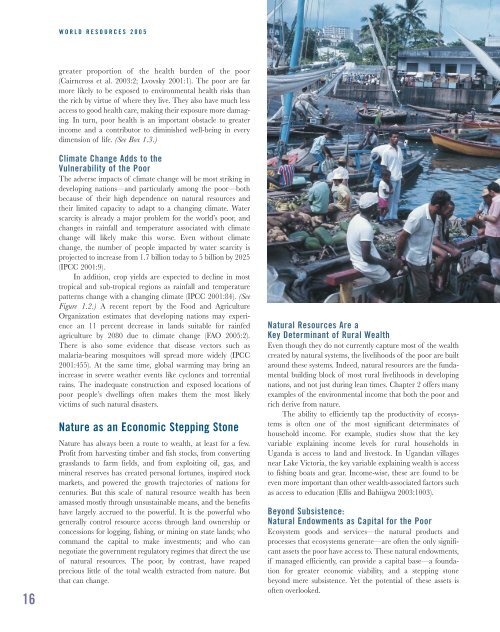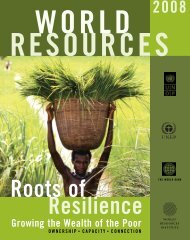jp8589 WRI.qxd - World Resources Institute
jp8589 WRI.qxd - World Resources Institute
jp8589 WRI.qxd - World Resources Institute
Create successful ePaper yourself
Turn your PDF publications into a flip-book with our unique Google optimized e-Paper software.
WORLD RESOURCES 2005<br />
16<br />
greater proportion of the health burden of the poor<br />
(Cairncross et al. 2003:2; Lvovsky 2001:1). The poor are far<br />
more likely to be exposed to environmental health risks than<br />
the rich by virtue of where they live. They also have much less<br />
access to good health care, making their exposure more damaging.<br />
In turn, poor health is an important obstacle to greater<br />
income and a contributor to diminished well-being in every<br />
dimension of life. (See Box 1.3.)<br />
Climate Change Adds to the<br />
Vulnerability of the Poor<br />
The adverse impacts of climate change will be most striking in<br />
developing nations—and particularly among the poor—both<br />
because of their high dependence on natural resources and<br />
their limited capacity to adapt to a changing climate. Water<br />
scarcity is already a major problem for the world’s poor, and<br />
changes in rainfall and temperature associated with climate<br />
change will likely make this worse. Even without climate<br />
change, the number of people impacted by water scarcity is<br />
projected to increase from 1.7 billion today to 5 billion by 2025<br />
(IPCC 2001:9).<br />
In addition, crop yields are expected to decline in most<br />
tropical and sub-tropical regions as rainfall and temperature<br />
patterns change with a changing climate (IPCC 2001:84). (See<br />
Figure 1.2.) A recent report by the Food and Agriculture<br />
Organization estimates that developing nations may experience<br />
an 11 percent decrease in lands suitable for rainfed<br />
agriculture by 2080 due to climate change (FAO 2005:2).<br />
There is also some evidence that disease vectors such as<br />
malaria-bearing mosquitoes will spread more widely (IPCC<br />
2001:455). At the same time, global warming may bring an<br />
increase in severe weather events like cyclones and torrential<br />
rains. The inadequate construction and exposed locations of<br />
poor people’s dwellings often makes them the most likely<br />
victims of such natural disasters.<br />
Nature as an Economic Stepping Stone<br />
Nature has always been a route to wealth, at least for a few.<br />
Profit from harvesting timber and fish stocks, from converting<br />
grasslands to farm fields, and from exploiting oil, gas, and<br />
mineral reserves has created personal fortunes, inspired stock<br />
markets, and powered the growth trajectories of nations for<br />
centuries. But this scale of natural resource wealth has been<br />
amassed mostly through unsustainable means, and the benefits<br />
have largely accrued to the powerful. It is the powerful who<br />
generally control resource access through land ownership or<br />
concessions for logging, fishing, or mining on state lands; who<br />
command the capital to make investments; and who can<br />
negotiate the government regulatory regimes that direct the use<br />
of natural resources. The poor, by contrast, have reaped<br />
precious little of the total wealth extracted from nature. But<br />
that can change.<br />
Natural <strong>Resources</strong> Are a<br />
Key Determinant of Rural Wealth<br />
Even though they do not currently capture most of the wealth<br />
created by natural systems, the livelihoods of the poor are built<br />
around these systems. Indeed, natural resources are the fundamental<br />
building block of most rural livelihoods in developing<br />
nations, and not just during lean times. Chapter 2 offers many<br />
examples of the environmental income that both the poor and<br />
rich derive from nature.<br />
The ability to efficiently tap the productivity of ecosystems<br />
is often one of the most significant determinates of<br />
household income. For example, studies show that the key<br />
variable explaining income levels for rural households in<br />
Uganda is access to land and livestock. In Ugandan villages<br />
near Lake Victoria, the key variable explaining wealth is access<br />
to fishing boats and gear. Income-wise, these are found to be<br />
even more important than other wealth-associated factors such<br />
as access to education (Ellis and Bahiigwa 2003:1003).<br />
Beyond Subsistence:<br />
Natural Endowments as Capital for the Poor<br />
Ecosystem goods and services—the natural products and<br />
processes that ecosystems generate—are often the only significant<br />
assets the poor have access to. These natural endowments,<br />
if managed efficiently, can provide a capital base—a foundation<br />
for greater economic viability, and a stepping stone<br />
beyond mere subsistence. Yet the potential of these assets is<br />
often overlooked.

















